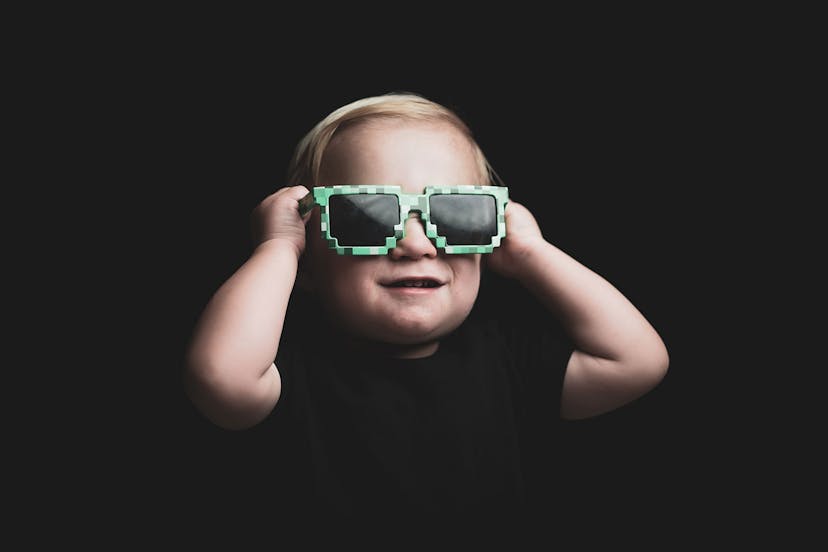
Myopia, also commonly known as near-sightedness, is a refractive error that causes objects in the distance to appear blurry. The word "myopia" comes from the Greek words "myein," which means to close, and "ops," which means eye, and it refers to the tendency of people with the condition to squint or close their eyes in order to see distant objects more clearly.
Children of all ages can develop myopia, which can significantly limit their capacity for learning and carrying out daily tasks. Myopic children may have trouble seeing the board at school, recognising individuals from a distance, or participating in activities that call for good distance vision.
Myopia in young people is growing more and more common, especially in East Asia, according to recent studies. A genetic predisposition, increased screen time, a lack of outside activities, and other variables are all expected to contribute to the future increase in the prevalence of myopia in children.
The sharp rise of the Myopia Epidemic within the younger populations has raised concerns on it`s prevalence; thus being identified by the World Health Organisation as one of the five ocular conditions needing to be strongly acknowledged, improved and treated in our children.
For children with myopia, there are numerous treatments available, some of which are prescribed by our Myopia Control Clinic. By using the common treatment of myopic glasses and contact lenses, the refractive error can be adjusted and distant vision can be improved. Orthokeratology (Ortho-K), also known as corneal reshaping therapy, is sometimes advised by opticians since it includes wearing special contact lenses all night to reshape the cornea and enhance daytime vision.
A fact many parents are unaware of is that there are lifestyle adjustments that may help delay the onset or progression of myopia in addition to corrective lenses or surgery. The following are some lifestyle elements that could cause myopia:

Spending Long Periods Of Time Indoors
There is evidence to support the idea that being exposed to outdoor light significantly helps to prevent and delay the development of myopia. Excessive screen time and limited outdoor time is a pure catalyst for the development of Myopia. It seems that in our modern world, our eyes are glued to screens, neglecting how valuable outdoor lighting may be to the future of our eye health. Connecting to nature and allowing our eyes to adjust to natural lighting may seem too simple of a solution, however, it is proven to be effective.
Children should be encouraged to spend at least 2 hours outdoors each day, whether it be for reading, studying, or playing sports. That too being spent in lighting of 10,000 LUX (the measurement of light levels in our environments). This light setting describes an environment similar to that of shade under a tree or a cloudy day. Almost shockingly an average classroom or office has an average lux of 500. This indicates an enormous jump in ambient lighting which unfortunately may account for a factor which hastens myopia development.
Mr John Bolger (Ophthalmologist and myopia specialist) is a keen advocate for actioning our everyday routines, tasks and common indoor habits into our natural environment, outdoors.
For some time it has been suspected that natural daylight gives the eye the correct data so that it knows when to stop enlarging. Now we are beginning to see scientific evidence to support this suspicion. Increasingly, research findings are that children who spend more time outdoors, especially when toddlers, are far less likely to be myopic or if they are already myopic they are far less likely to progress rapidly. - Mr John Bolger (Ophthalmologist, Myopia specialist)

Screen time: Reading, learning from screens and doing homework is important for children and teens, but they should take short breaks from close work every 20 minutes to relax the focusing muscles of the eyes. Keeping at least a forearm’s distance between their eyes and their close work at all times helps to reduce eye strain and risk of myopia.

Lack of exercise: Exercise has been associated with a lower risk of myopia. Encourage kids to exercise frequently by playing sports or taking them for walks.

Poor diet: An imbalanced diet could lead the body to be deficient in vitamins, proteins, and trace elements during the course of a child's development. This may also influence the child's development of vision and contribute to the onset and progression of myopia. It is advised to consume as many fruits and vegetables that are high in numerous vitamins as you can as part of your diet. Vitamin A and C-rich foods have some resistance to the development of myopia.

Lack of sleep: According to research, getting too little sleep may contribute to a risk of developing myopia. Encourage kids to obtain the amount of sleep that is suggested for their age. Recommended sleeping hours for children vary with age (3-5 years : 10-13 hours , 6-12 years : 9-12 hours , 13-18 years 8-10 hours). Particularly, multiple studies have related increased myopia with disturbed sleep, involving poor quality, inadequate hours, late bedtime, and delayed melatonin circadian timing. The hormone that starts sleep, melatonin, has been found to be present in higher concentrations in myopes than in non-myopes in the morning.

Genetics: Although genetic susceptibility may increase the chances of your child developing myopia, it is more the lifestyle habits of the parents being passed down. Thus, the lifestyle that the parents have adopted may have led them to hasten their myopia development and hence would cause their children to indirectly develop their lifestyle and condition.
Overall, encouraging an active, healthy lifestyle that includes plenty of outdoor time and a balanced diet may help lower the chance of myopia. Regular eye exams are also essential to detect and address any problems with your vision.
Children who take atropine have shown slower progression of myopia than those who do not seek appropriate treatment. Typically, atropine eye drops are prescribed for this aim. They slow the progression of myopia in children by relaxing the eye's muscles and dilating the pupil, which can assist in minimising the pressure on the eyes that might cause myopia.
Atropine is often prescribed at a dose of 0.01%, which is lower than the concentration used for other medical procedures. The drops are typically given once daily, in the evening, and they can temporarily make you more sensitive to light and blurry.
Atropine eye drops are frequently used in conjunction with other therapies like corrective lenses or orthokeratology (a form of contact lens worn nightly to reshape the cornea). It is crucial to understand that atropine therapy does not totally halt the growth of myopia and is not a solution for the condition.
There are in excess of 6,000 scientific peer-reviewed papers published showing that low-dose Atropine is both effective and safe for myopia control in children. And that is consistent with our experience with our own patients in our clinic.
Empower Your Child's Vision With My-iClinic!
Is your child struggling with Myopia? Don't let it hold them back! My-iClinic is here to provide expert care and innovative solutions tailored just for them.
Why Choose My-iClinic?
Specialised Pediatric Expertise: Our dedicated team understands children's unique vision needs, ensuring the best care possible.
Cutting-Edge Technology: We leverage the latest advancements to provide accurate diagnoses and effective treatments.
Personalised Treatment Plans: Every child is different. Our custom solutions are designed to suit individual needs and lifestyles.
Empowering Futures: Clear vision paves the way for brighter opportunities. Give your child the gift of clear sight!
Help Your Child See a Bright Future! Take Action Now
Schedule a Consultation: Book an appointment with My-iClinic's experienced pediatric eye specialists.
Explore Tailored Solutions: Discover personalised treatment options designed to fit your child's lifestyle.
Witness the Transformation: Watch your child's world come into focus and thrive with confidence!
Find out more by Speaking to our team









